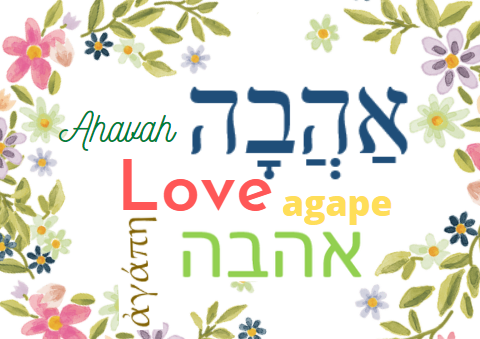Ahavah אַהֲבָה (pronounced ah-ha-vah)
is a Biblical Hebrew noun translated in English as love. Its verb form is ahav אָהַ֤ב (pronounced ah-hav). You’re probably reading an English Bible and have read the word love in many places. For example, love appears 131 times in the Old Testament and 310 times in the King James Bible. Interestingly, not all of them meant ahavah in the original Hebrew. In this article, we’ll focus on ahavah. What is it?
The word first appeared in the Bible in Genesis 22:2, “Then He said, ‘Take your son, your only son whom you love (ahav)—Isaac—and go to the land of Moriah, and offer him there as a burnt offering on one of the mountains about which I will tell you.’” Ahavah conveys such an intense feeling in which a person delights earnestly toward another. It implies having a singular and fixed mind on an object or person. Some examples in the Bible are Abraham’s parental love toward his son Isaac; Jacob’s ahavah toward Rachel (Gen. 29:18), Jonathan’s brotherly love toward David (1 Sam 18:1), Isaac’s love for savory meat (Gen. 27:4), and God’s ahavah toward Israel (Deut. 7: 7-8). Deuteronomy 6: 5 demonstrates the intensity that ahavah can potentially be expressed: “You shall ahav the Lord your God with all your heart, and with all your soul, and with all your strength”. Notice “all” placed prior to each of the three aspects: all or whole of your heart, whole of your soul, and whole of your strength. This was GOD’s intent for the commandment. “All” would convey a different meaning if it were placed once in the beginning in which case it would refer to composite three i.e., without missing one of them.
Ahavah is closely related to several positive spiritual traits. 1 Corinthians 13:4-7, makes a list of 14 descriptions for ahavah (agape in Greek) as being patient, kind, does not envy, does not brag, is not puffed up, does not behave inappropriately, does not seek its own way, is not provoked, keeps no account of wrong, does not rejoice over injustice, bears all things, believes all things, hopes all things, endures all things. Ahavah encompasses such a broad range of qualities. The chapter then concludes that of the three remaining—faith, hope, and love (ahavah)—ahavah is the greatest (v. 13). How does it work? The most marvelous act and lofty thing that any believer could perform such as prophesy will be reduced to nothing if it wasn’t motivated by ahavah. Conversely, a seemingly insignificant work as arranging chairs in the synagogue could have an elevated outcome and consequential benefit for many if done with ahavah.
In the Bible, ahavah isn't just an emotion and intense feeling. It is active and finds its outward expression through the act of giving. However, it’s not simply any form of giving. As the saying goes, “you can give without loving, but you cannot love without giving”. Pure ahavah has to do with what is being given—the quality of the gift—and how that gift is being given—sacrificially. In this sense, God Himself perfectly demonstrated the special connection between ahavah and giving by Him giving His Son to humanity: “For God so ahav the world that He gave His only begotten Son (the gift) that whosoever believes in Him shall not perish but have everlasting life (a result of sacrificial giving).” (John 3:16) Baruch HaShem, God’s ahavah never fails!
Hope you enjoyed our Hebrew vocabulary today. We'll look into joy next. Till the next time. Shalom!


